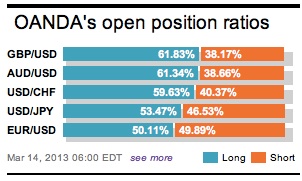So far, equity markets are grinding higher, pushed by better-than- expected U.S. data resisting fiscal headwinds. Rates have re-emerged as a major driver of currencies. The ECB may yet cut rates but the reality is that, after such a move, we would return to trading currencies in a zero-interest-rate-policy (ZIRP) world, with far less volatility and a market much more controlled by Central Banks, just like before the rise of Abenomics.
Watching the Bund/Treasury spread is important. A notable development lately has been the rising premium investors charge to own treasuries over bunds. The current spread of +57bp is the widest in two-and-a-half-years. The widening is gathering steam, as economic data boosts optimism that US growth will finally pull firmly ahead of the Euro-zone. The US 10’s yield rally is helping to support the “mighty’ buck, proving somewhat that the dollar is being brought largely on expectations of an end to QE.

The market must now question the validity of recent game changing data, like last weeks US employment report – investors cannot afford to get too far ahead of themselves. Yesterday’s US 10-year issue saw +47% of +$21b auction being awarded to indirect bidders, a proxy for overseas interest. This is the highest foreign interest in over two-years. The reason why? Interest rates, 10’s trading through +2% improves foreign demand. This higher yield seems to be the markets psychological risk/reward threshold. Investors technically still have reservations about the current state of the global economy.
Before the significant rate announcements from the SNB and Norges Bank, the AUD/NZD was the big mover overnight, rallying sharply after a less hawkish than expected RBNZ, and sharply higher Aussie employment gain.

New Zealand’s Reserve Bank kept the official cash rate unchanged at +2.50% as expected, and extended its forward guidance to keep OCR unchanged “though the end of the year”. While downside risks to global growth have receded, domestic recovery is uneven. Kiwi policy makers remain concerned that the overvalued NZD is undermining profitability in export and import competing industries.
Australia’s employment rose +71.5k last month, following a revised +13.1k increase in January. It’s the strongest monthly gain in 13-years. The details were a tad uneven with full-time employment rising +17.8k and part-time +53.7k. The unemployment rate was steady at +5.4% in February as more people pursued work. Since the announcement the AUD is off the boil after the RBA comment that the February employment data is subject to some statistical error number.
The currency that is perhaps becoming too much trouble to trade –the CHF- had been waiting patiently for any changes from the SNB. There were no surprises this morning. The Swiss central bank pledged to keep up its “defense of the franc cap after almost doubling its currency holdings to shield the country from the fallout.” As expected, policy makers remain prepared to take all necessary measures to keep the “high” franc within the limit of 1.20 (EUR/CHF). It also kept the band for its benchmark interest rate at zero-0.25%. Growth is expected to be +1% to +1.5% this year, unchanged from Decembers forecast, while prices are expected to fall -0.2%, and rise +0.2% 2014, a change up from Decembers forecast. Policy makers at the SNB do not expect a breach of its price stability threshold – positive inflation below +2% – in the next three-years.

The Norwegian Central Bank (Norges Bank) has left its policy rate unchanged at +1.5% as expected. The unexpected part was perhaps the “dovish tilt” in the statement with the central bank saying that growth and inflation has been lower than expected. Analysts note that the rolling rate hike has been pushed out to spring 2014, as opposed to mid-this year. In hindsight, Policy makers seem happy with their own currency, saying that the NOK is in line with its October forecast.
The market will now shift gears and focus on the European leaders, who begin a two-day Brussels summit this morning. Tomorrow, Euro-area finance ministers will meet to discuss a bailout for Cyprus. The leaders agenda has changed with different priorities now existing. Policy makers are required to loosen austerity measures as the recession and mounting unemployment, especially in the peripheries, overtake the debt crisis as the region’s biggest headache. Market anxiety is growing steadily, primarily regarding these Euro-zone developments. Nobody is expecting anything concrete from the summit, but there is the potential for surprises – maybe from Cyprus, the Euro-zones systemic risk hotspot.

The market is looking for an incentive to buy the ‘single’ unit. The 17-member currency has experienced limited recovery since erasing Wednesday’s 1.2950 barriers. Market volatility remains supported near recent lows, however more barriers appear ‘en mass’ downside through 1.2500. Today’s bigger expiries are at 1.2925, 50 and 1.3000. Positive news from the EU summit could lift the pair above 1.30, however, it seems the market remains concerned that upcoming US data will nix any EUR flight higher. Fundamentally the EUR has nothing to counter the ‘mighty’ dollar.

Other Links:
Are The Yen Bears Afraid To Lose Face?
This article is for general information purposes only. It is not investment advice or a solution to buy or sell securities. Opinions are the authors; not necessarily that of OANDA Corporation or any of its affiliates, subsidiaries, officers or directors. Leveraged trading is high risk and not suitable for all. You could lose all of your deposited funds.


